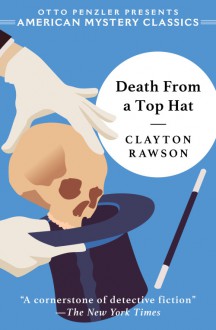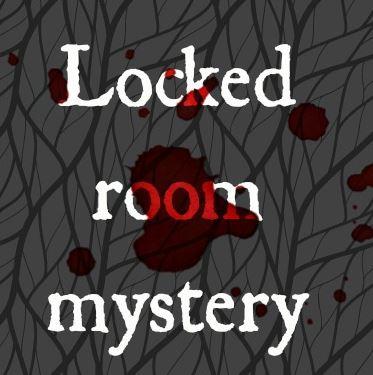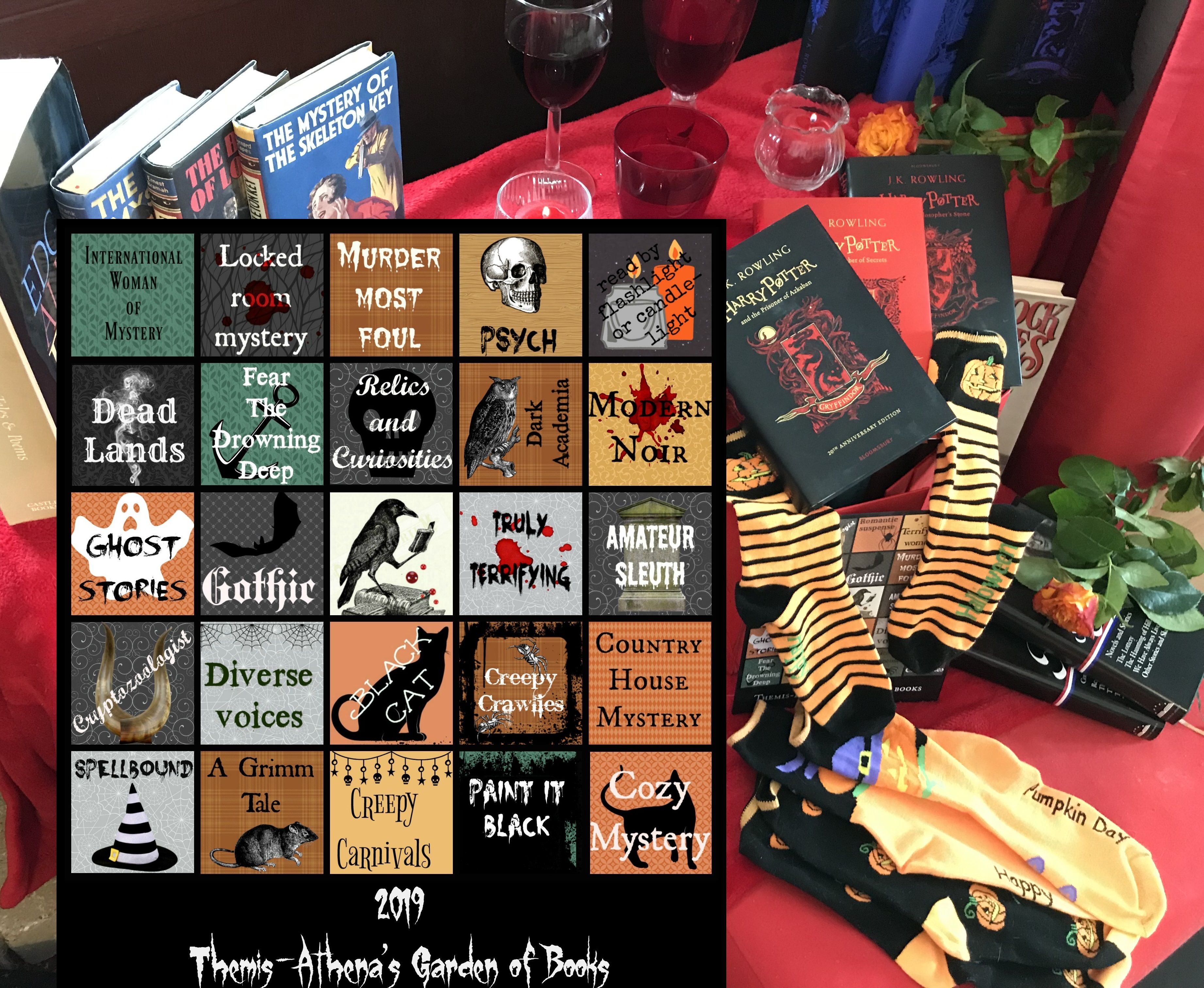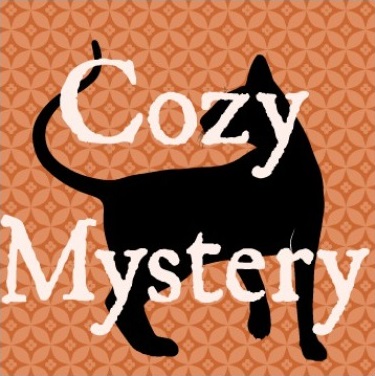
Reading blackout before the end of the first bingo month and two more completed bingos in week 4 for a total of three bingos so far -- if anybody had told me this going in, I'd have questioned their sanity. Not least because I had a major project to complete this month, which I knew was going to involve a lot of meetings and time in the car -- but all that time spent driving, and waiting for meetings to begin, turned out a blessing in disguise. Either way, I'll take it! Especially since my final reads for my card turned out really, really great as well.
Now that I've completed my books for the squares on my card, I'm going to move on to a couple of the squares not on my card -- first and foremost those from which I'd have picked my options for my three transfiguration spells if I had needed them. I'll be posting my progress with those on my bingo master tracking post.


Clayton Rawson: Death from a Top Hat![]()
My first book of the week was another excursion into the world of Golden Age mysteries; this time one set in the U.S.; the first book of Clayton Rawson's Great Merlini series, focusing on a famous magician who, instead of resting on his laurels, has opened a magic shop and, as a sideline, agrees to help the police solving crimes set in his milieu.
Like most locked room mysteries, this book is best enjoyed in print -- or if as an audiobook, at least with the print edition not too far away, as the print edition includes images of the crime scenes (yes, there are several) as well as other diagrams, all of which are darned near indispensable to following the plot, let alone trying to solve the mystery. As you'd expect in any book with a magician at its center, slights of hand, trap doors and other instances of misdirection play a huge part here, and although they are not all visual, being able to trace them on the scene of crime images helps a lot.
What I particularly enjoyed in this book, though, were its manifold hattips to virtually all the great authors and detectives of Golden Age crime fiction -- Rawson's contemporaries as well as those of prior decades. There is a long paragraph right at the beginning of the book, and many more references throughout; some (from a modern reader's POV) a bit veiled, some less so -- although doublessly all of them would have made instant sense to Rawson's contemporary readers. Rawson truly treasured the great mystery authors of his own time, and in turn, John Dickson Carr considered him one of the masters of the locked room genre and one of the six best mystery writers of the era: One may or may not agree with the second part of that compliment, but there is no doubt about the truth of the first part, and I am glad that, once more, Martin Edwards (in his two nonfiction books on the Golden Age) and Otto Penzler (by republishing this particular book) have collectively brought him to my attention.


Delia Owens: Where the Crawdads Sing![]()
A wonderfully atmospheric book set in the marshes on the North Carolina coast; the story of Kya Clark, who is successively abandoned by her entire family while still a child, manages to survive in the derelict family home with the help of a few well-meaning friends, autodidactically (though jump-started by a former friend of her elder brother's, who eventually becomes her friend as well) turns herself into a marshland biologist, ecologist and science writer of considerable renown -- and yet finally has to face up to her community's lifelong prejudice arising from her unusual lifestyle, over an accusation with potentially catastrophic consequences.
The bulk of the book is told in two parallel timelines; one following Kya from childhood to adult life; the other set during her young adult age and dealing with the event that will eventually threaten to bring her very life and existence under threat. (It is at this latter point that both timelines merge into one.) Kya is a heroine impossible not to root for, and Owens's writing, particularly in the first half of the book, is richly lyrical and emotive (without ever overstepping the boundaries towards facile emotionality), taking you right into the Carolina marshes, and into Kya's person. In the second part, I could have done with a somewhat less extensive exploration of the courtroom scenario -- which may sound weird, coming from me, as I do enjoy courtroom scenes a lot in mysteries (and of course courtrooms also feature rather largely in my day job); however, even though Owens was obviously using the sterile, formalistic operations of the state justice system as a deliberately jarring contrast with the freedom of Kya's life in the marshes and her intimacy with nature, I felt that part of the book could have done with a bit of streamlining. Overall, though, this was a wonderful discovery and definitely one of the highlights among this year's bingo reads.


Terry Pratchett: Monstrous Regiment![]()
I had initially been planning to read Terry Pratchett's Pyramids (also the Discworld group's October group read) for this square, but given that I was ready for the square before October had rolled around and I still want to do the Discworld group read in any event, a quick switch to another one of Pratchett's (de facto) standalone Discworld novels was called for; the justification for being applied to the "Deadlands" square being provided, in this particular instance, by a vampire named Maladict (who has managed to switch his craving for blood into a craving for coffee) and a few, albeit minor appearances by Ankh-Morpork Night Watch member Reg Shoe, who is a zombie.



Margaret Atwood: The Handmaid's Tale and The Testaments![]()
See separate post HERE.
... as of today; with my "virgin" card below for reference:


Well, that was as soul-drenching as any double bill ever was (even though The Testaments is marginally more optimistic than The Handmaid's Tale).
It's not always a good idea for an author to revisit one of their standout classics decades later, but in this instance it clearly worked. Atwood stays faithful to the original tale while supplying additional depth to the world she created there. (Now it remains to be seen whether the TV series, in turn, is going to stay true to the story as set out in The Testaments, which is set a decade and a half later. Though I'm not sure Atwood herself considers more than a few basic facts from the TV series "canon" as far as her novels are conscerned.)
And Atwood has clearly done her homework on dictatorships, theocratic and otherwise -- which is, of course, a large part of what makes Gilead come across as so goddamned credible (and hence, so goddamned frightening). Like the authors of other dystopias (Orwell's 1984, Bradbury's Fahrenheit 451, Du Maurier's Rule Britannia) -- and also like Terry Pratchett in the first Night Watch novel, Guards' Guards! -- she points out that once a country's democratic foundations have been allowed to weaken, it doesn't even take a violent toppling of government for a dictatorship to take root -- and while she may have been inspired by recent events to revisit Gilead and write The Testaments, this clearly is at the heart of The Handmaid's Tale as well, as it is there that the notion is presciently first given voice.
I'm glad I went through both novels back to back, and Halloween Bingo couldn't have ended on a bigger exclamation mark. I also fervently hope the world doesn't even get within the equator's total length of Gilead, however; or rather, the actually existing theocracies will eventually be rooted out once and for all and no new ones will be added, anywhere on earth. Most especially and for the immediate future I hope the Western world will come to its collective senses and manage to make a U-turn from the course that it started to take somewhere around the mid-2010s. Heaven knows what the participants of late-22nd century historical conferences will otherwise have to say about us.

Well, the third week really hit my bingo experience out of the ballpark this year -- and not only because it finished with my first completed bingo; that was actually just the icing on the cake. But it included no less than three absolutely knock-out fabulous books, plus a fourth that was almost as good -- and the remaining three, though not quite reaching this level, were at least mostly enjoyable, all in their own particular way. So without any further ado:


Sofi Oksanen: Fegefeuer (The Purge)![]()
Based on everything I'd previously heard about this book, it took me quite a while to get up my nerve to read it, because I knew I'd be in for a fairly merciless game of psychological hares and foxes -- which however, of course, meant that it would be a natural choice for the "Psych" bingo square.
Sofi Oksanen's The Purge contrasts the early 1990s' post-Soviet Union independent Estonia with that of the WWII and post-WWII era which had led to the country's being swallowed up by the Soviet Union. The setting in which this happens is the isolated farm where one of the novel's protagonists, has been living almost all her life, and where at the beginning of the book the other protagonist -- a young woman who is obviously on the run -- suddenly appears, seeking refuge. Although the two women have never seen each other in their entire lives (and the young refugee for all practical purposes is Russian rather than Estonian), it soon becomes clear that it is by no means an accident for her to show up in this place and none other. What follows is a dance macabre style exploration of death, guilt, betrayal, running away from versus accepting responsibility for one's own actions, and one (or two?) families' entanglement with Estonia's and the Soviet Union's brutal social and political order in the second half of the 20th century. This is an uncomfortable read, but it perfectly encapsulates the mental, psychological, political and social purge that every society will embark on both upon slipping into and upon freeing itself from a dictatorial system; and particularly in today's political climate it comes highly recommended.


Terry Pratchett: Guards! Guards!![]()
And talking about books that ought to be read, today more than ever, this turned out to be yet another one, right on the heels of Oksanen's. The eighth Discworld novel and the first book of the Night Watch subseries -- but first and foremost, an exploration of just how a political system can fail and slip into dictatorships right before everybody's eyes. Whatever it was that motivated Pratchett to write this book exactly 30 years ago, in the waning days of the Cold War, it is eerily prescient and feels as if it were written this or last year; so exactly does it foretell recent events (particularly in the UK and the U.S., but by far not merely there). There is, of course, also plenty of Pratchett's trademark pith and humor, and plenty of lines that, at least in the first part of the book, will make you laugh out loud; but in the second half, more often than not your laughter is going to get stuck right in your throat.
Oh, and in case anyone is wondering about my bingo square attribution, it features dragons. Plural -- but one in particular.


Margery Allingham: The White Cottage Mystery![]()
Allingham's first mystery, and it clearly shows off her talent as a writer from the start. As in the first Albert Campion book (The Crime at Black Dudley) and several of the subsequent Campion mysteries, there's an international "detour" -- here: literally so -- that is not in any way, shape and form necessary to the plot and that I could therefore have done without, and it's no particular surprise that Allingham later chose a somewhat more flamboyant hero for the series she would come to write. But for an afternoon's (or in my case, morning's) worth of entertainment this works very nicely indeed.


BBC Audio: The Lady Detectives![]()







... as of today; with my "virgin" card below for reference:


A day late (though hopefully not a dollar short), here's my "second bingo week" summary; and it's a summary of a much better week than the first one turned out to be. (So, yey!) For one thing this is due to the books, all of which were either outright winners or at least enjoyable on some level or other; for another, even though I finished the week with a fairly lengthy read AND RL was running really major interference, I managed to keep it to an average of one book per day, as a result of which -- and as importantly, due to the way the bingo calls have been coming in -- I've now got several sets of multiple "called and read" squares in a row or column (two of which, also with all five squares marked "read"). Obviously, even three squares marked "called and read" in a row don't necessarily mean I'll be in for a bingo anytime soon, but that one is down to the bingo gods. All I can do is go on reading ...


Peter Ackroyd: Hawksmoor![]()
The second bingo week's first book, and for the longest time it was on a solid track for a 4 1/2 or even 5-star rating. Tremendously atmospheric, with London (both 17th century and present day) not so much merely setting but additional character and two timelines tantalizingly mirroring and winding around each other like the two strings of a double helix. From early on, this is also a book that knows very well just how clever it is, but during the first 90-95% that doesn't matter a jot ... until it does in the end and Ackroyd takes "clever" a step too far into the symbolic, as a result of which the ending is seriously deflating. What a pity that he proved unable to contend himself with an actual dénouement (however cleverly constructed and meaningful) and instead chose to let narrative lift off and take flight straight into the ether instead. Still, for the vast majority of its contents, definitely a recommended read -- and the beginning in particular, set in the days of the 1665 plague and tying together the plague, a satanic cult, church construction and murder (mirrored by present-day murders in the same churches), definitely packs a punch.


Patricia Wentworth: Eternity Ring![]()
Another book off to a great start; if for no other reason than the fact that we get to meet Frank Abbott's family and learn why he didn't become a lawyer -- as had initially been his chosen career path -- but a policeman instead. (Wentworth takes us back to Frank's family home in a much later installment of the series, The Fingerprint, which I had already read before moving on to this one, but that only made it feel even more of a priority to finally catch up with this story as well.) It felt good to be back in Miss Silver's (and Frank Abbott's) world in one of the final novels from the series that I had / have yet to read, and it was cruising along nicely and could easily have earned a higher rating, too ... if it hadn't been for the fact that (1) the murderer is fairly easily to deduce by process of elimination and by looking at it from the perspective of where Wentworth herself, as a writer, was likely going to want to take this book's plot; (2) the conflict besetting the married couple at the heart of the novel feels terribly manufactured (first because during 99% of the book it isn't explained at all, and then because the explanation, when finally offered literally on the very last pages, comes across as ridiculously contrived); and (3) the heroine is exhibiting serious bouts of TSTL behaviour both in connection with the aforementioned conflict and in the moments immediately preceding the big reveal.


Bob Berman: Earth-Shattering![]()
Neither as "epic" nor as "profound" as the blurb promises, and definitely higher on the "popular" than on the "science" part of "popular science writing". Based on his style of writing, I can very well imagine Berman as a personable guide at his local observatory or as a host of popular radio science programs; the problem is that what sounds approachable in dialogue and oral explanation just comes across as chatty in writing. (This gets better once the book has left the opening chapters behind, but it never goes away entirely, and arguably the Big Bang -- which is the subject of the first single-topic chapter, i.e., chapter two -- should be the last subject you want to approach with that much of a casual attitude. For purposes of the audio version, it definitely also does not help that the casualness factor is virtually automatically enhanced in oral performance -- which isn't necessarily down to the narrator; it's just in the nature of the beast.)
In fairness, astronomy, nuclear and astrophysics will never be my strongest subjects, so as far as the actual depth of topical penetration went, it may have been a blessing in diguise that the book didn't do much more than give an overview of the various types of cataclysms and in so doing, rarely did more than scratch the surface. (Then again, I tend to acquire both a quicker and a more profound grasp of any topic presented to me both at greater length and in greater depth than here.) Eitiher way, this was enjoyable for what it was or turned out to be, but IMHO it's seriously being oversold in the blurb -- the author himself also seems to be quite the efficient self-promoter -- and I think it's at least also fair to wonder what medical and man-made events such as the medieval plague epidemics and WWII are doing in a book explicitly setting out to deal with astrophysical and earth-bound types of physical cataclysms.


Fredric Brown: The Dead Ringer![]()
Brown's second Ed & Am Hunter novel and the book that, thanks to Tigus's generous gift of last year, has been pencilled in for precisely this square ever since. I truly enjoyed my return to the Chicago and Midwest of the Classic Noir era -- Brown's writing and plot construction easily stands up to that of the likes of Chandler and Hammett, and despite their less-than-bed-of-roses life experience both of his heroes are decidedly less cynical than Messrs. Marlowe and Spade, which makes for an interesting change from the classic noir approach.
(Though now that Ed has had his first bruises from a prolongued encounter with a blonde bombshell gold-digger, I hope his views on women in general aren't going to end up being overly skewed too fast.)
In this particular book, it also plays out to great effect that Brown knew the mid-20th century carney world from the inside -- from the start, the setting with all of its bizarre characters and attractions and its very own language (carney talk) comes alive in a way it only can if described by someone who once used to walk the walk himself.


Michael Gilbert: Smallbone Deceased![]()
In my travels in the world of classic crime fiction, one of my truly overdue reads -- a book rightly renowned for its dry sense of humor and truly unique way of disposing of a body. If you ever thought a crime novel set in a law office specializing on wills, trusts and property law is bound to get mired in the dust of legal lingo and technical details, think again. Given this mystery's setting and the murdered man's position, the motive for the murder isn't hard to guess (though not all of the details are equally obvious), but thanks to the understated irony of Gilbert's writing, this is deservedly one of the novels that have endured and can still be enjoyed in an era when lawyer's deed boxes are long since a thing of the past.
Side note: Treat yourself to the print edition, not the Michael Mcstay audio -- Mcstay's preferred style of narration consists of hurling rapidly mumbled bursts of speech at the reader, which makes following his performance decidedly more of a chore than it reasonably ought to be.


Anthony Rolls: Scarweather![]()
Quite a change of pace compared to the author's Family Matters, the first book by Rolls that I read -- but if the two books have one thing in common, it's a sense of the unusual and extraordinary, and an incurable urge to pour the acid of satire on experts (self-appointed and otherwise) and on society's habit of treating them, and each one of their pronouncements, as holy cows -- as sages whose every word must be weighed in gold and not under any circumstances be questioned. In Family Matters, it's doctors, chemists and forensic experts (who are bamboozled by an onslaught of unlikely medical coincidences in connection with a death occurring in the context of a breakdown of a marriage); here it's archeologists. There is no way this book can be fairly summed up without spoiling half the plot, but if you should decide to tag along with the narrator and his Holmesean scientist friend, you're in for quite a ride ... even if somewhere between the 50% and the 75% mark you'll probably have quite a good idea of what will be waiting for you at the end of the journey.


Jim Butcher: The Aeronaut's Windlass![]()
The week's longest read and, perhaps surprisingly, not its best one. To start with the plus side, this novel's most interesting characters (and its single most outstanding feature) are the cats -- not merely Rowl, the feline protagonist, but all of them; not least also Naun, the giant black tomcat leader of a tribe of street (or rather, tunnel) cats whose character constituted my reason for attributing this book to the "black cat" bingo square. (Rowl is a ginger.) Butcher really "gets" cats, and their scenes come across as both laugh-out-loud funny and entirely authentic. Needless to say, almost all of the cats in this book are completely badass -- Rowl first and foremost. If the rest of the book had lived up to the cats, unquestionably this would have ended up straight on my "favorites" shelf.
Unfortunately, that was not to be. And it's not the fault of the human characters, either -- particularly the three young women, Bridget, Gwen(dolyn) and Folly, as well as Captain Grimm (the eponymous aeronaut) and Gwen's cousin Benedict -- but Butcher's own approach to storytelling. (Which, incidentally, also makes me even more wary about his Dresden Files series than I had been before reading this book.) The main characters in The Aeronaut's Windlass are fine, and if Butcher had given them (and me) different stuff to work with, I'd be eager to follow them on their future adventures. As it is ... well, let's just say the jury is still out on that one.
For one thing, the world building here is not anywhere near as innovative as blurb writers and five-star reviews want to make you believe: Heaven knows I'm not the most ardent reader of speculative fiction, and if even I recognize some the stuff cribbed from elsewhere, there's bound to be a lot more that I didn't see. (Seriously, Mr. Butcher -- Habble Landing as a place name and The House of Lancaster as one of the ruling families? Geez, I thought George R.R. Martin was derivative, but are we into the derivative of a derivative now? And a Discworld style guild system (only minus the satire)?? Be glad you're not being sued by the estate of Terry Pratchett.)
Similarly, Captain Grimm and the whole aeronautics thing -- warfare, tactical battle manoeuvers, ship construction and equipment, even down to the details of (aero)nautical language included -- are straight out of Patrick O'Brian's Master and Commander and C.S. Forester's Horatio Hornblower series: Replace aeronautics (obviously, with the sole exception of aerial ascents and descents) by early 19th century / Napoleonic Wars seafaring craft, ships, and language, and that is precisely what you get. Grimm himself, too, is so obviously a cousin to Hornblower in his more mature years and to his former Captain Pellew -- and Grimm's Predator a near-identical twin of Jack Aubrey's HMS Surprise (plus the whole "privateer" subplot / past so obviously built on O'Brian's Letter of Marque, as well as, incidentally, Rafael Sabatini's Captain Blood) -- that Forester's and O'Brian's (and Sabatini's) estates should, by rights, be asking for a share of the royalties as well. To be fair, from the book's descriptions this was the one aspect I had expected -- just don't please anybody tell me that this is anything even close to original.
Finally, while I did appreciate the whole "cinder spire" idea, and I seriously also appreciate the absence of any sort of infodumps, I would have liked to find out a lot more, over the course of the book, what happened to make Earth's "surface" world an uninhabitable wilderness and caused "the Builders" generation to construct the spires to begin with -- and I'm also not entirely clear how you get to square an alleged "democracy" (this is the exact term actually used) with a de-facto king (called Spirearch) who is quite obviously much more than merely a representative figure and wields true power.
My other gripes tie into those that I have with a lot of speculative fiction (especially sci-fi, as well as George R.R. Martin's Song of Ice and Fire series), so this may be an instance of "it's not you, book, it's me" -- but anyway, the book's plot essentially consists of an incessant series of incidents of armed combat (aeronautic and on terra firma / the spires alike), every single one of which incidents goes down according to the tried and true formula of "hero(es) drawn into fight by overwhelming enemy force -- hero(es) bravely stand their ground in the face of impossible odds -- after a while enemies seem to get the upper hand after all -- and a millisecond before it all goes pear-shaped for good salvation for hero(es) comes from unexpected quarters". Sorry, but this sort of stuff flat-out bores me every time it's served up more than once to begin with (preferably only at a book's point of climax), and that is true even more if the entire plot of a 700+ page book consists of little else. (And it is even more true if I can anticipate the precise person or group providing the last-minute rescue -- even if not also the precise manner -- at least a chapter or two in advance, as was invariably the case here.)
On a related note, "surviving impossible odds in battle" also seems to be the only thing accounting for whatever character growth we seem to be seeing in this book; especially with regard to the younger main characters, particularly the young women, all of whom are inexperienced recruits and barely out of their teens. OK, so Gwen has her moment of "how do I go back from all this warfare and combat to ordinary everyday civilian life" at the end of the book, and that was another moment I truly appreciated. I just would have wished there had been more of this, instead of our protagonists incessantly rushing from one fight to the next -- and I would also have wished there had been some experiences for them to grow on outside the fighting stuff, as there are (aplenty) in the Hornblower and Aubrey / Maturin books.
Long story short, it's a miracle this book hasn't been made into a movie yet -- there's plenty of things going "boom" with a vengeance, the CGI department would have a field day, and there are also plenty of great characters to root for, both feline and human. And who knows, I might even watch that movie. But the whole thing is also so similar to the movies that made me essentially stop caring about any new blockbuster releases years ago that I'm not sure whether I ultimately would go and see it. And I'm not sure I'm going to be reading the sequel to this book, either ... even though Rowl (and Naun) might eventually tempt me to do so after all.
... as of today:
